News
News Release
NII and CERN Sign a Memorandum of Understanding on Joint Development of Next Generation Repository System
The National Institute of Informatics, Research Organization of Information and Systems, Inter-University Research Institute Corporation (NII/Director General: Masaru Kitsuregawa/Chiyoda-ku, Tokyo, Japan) and European Organization for Nuclear Research (CERN/Head of the Information Technology Department: Frédéric Hemmer/Geneva, Switzerland) signed a memorandum of understanding as of September 4, to collaborate in the development of research support tool and software. As for the first project, NII and CERN will start the joint development of a next generation repository system, which has a strong impact on scholarly communication network. The new system encourages researchers to share their research output and consequently facilitate open science.
Background
Open science is a movement that aims to make research data, software, and other research components, in addition to the research paper, widely available via the Internet, and it is attracting attention as a new way of research approach. It has a strong advantage for improving the efficiency and productivity of research by reducing the duplication of experiments and by making research data available for other research groups. The repository itself plays an important role as a distributed, globally networked infrastructure for open science.
The Confederation of Open Access Repositories (COAR) is an international association for the repository community to build capacity, align policies and practices, and act as a global voice for the community. (*1) In order to establish the repository more research-centric, open to and supportive of innovation, while also collectively managed by the scholarly community, COAR proposed principles and technical recommendation for next generation repository (NGR) system. (*2)
Joint Development in Repository Software
CERN (*3), the European Organization for Nuclear Research, sits astride the Franco-Swiss border near Geneva. It was one of Europe's first joint ventures and now has 22 member states. The physicists and engineers at CERN are probing the fundamental structure of the universe and use the world's largest and most complex scientific instruments to study the basic constituents of matter - the fundamental particles. Thousands of physicists from more than a hundred of institutes and universities worldwide participate to the experiments hosted at CERN and create a massive research ouput. To preserve it for the future and facilitate results' sharing, since 2002, CERN has been developing the repository software named Invenio.
Since 2008, NII also has been developed the original repository software named WEKO. WEKO is now utilized by more than 500 Japanese institutions through a cloud service named JAIRO Cloud which is operated by NII. Because of Invenio's modular and flexible architecture, NII has decided to use Invenio for the new framework of the WEKO repository system. NII will develop several needed functionalities for WEKO3 and along the way will contribute to the development of the new Invenio 3 framework. This activity will generate many new Invenio modules that do not exist yet, and that are interesting for the world wide Invenio community. NII will contribute these modules back to the Invenio core framework, as much as possible. CERN will provide support and advice on how to achieve this goal and make those aforementioned modules reusable.
Due to the evolving nature of Invenio and the creation of WEKO3, many modules related to COAR NGR capabilities will be addressed during the upcoming years. Both NII and CERN will collaborate on developing a subset of the NGR features recommended by COAR NGR Working Group. The advantage of NII is to deploy these developments through JAIRO Cloud service and consequently Japanese institutions will instantly ready to work with COAR NGR vision. CERN will also implement them into Zenodo data repository and related digital library services. Through these activities, both institutions strongly contribute to create a new scholarly communication network.
About the National Institute of Informatics (NII)
NII is Japan's only academic research institute dedicated to the new discipline of informatics. Its mission is to "create future value" in informatics. NII conducts both long-term basic research and practical research aimed at solving social problems in a wide range of informatics research fields--from fundamental theories to the latest topics, such as artificial intelligence, big data, the Internet of Things (IoT) and information security. Also, as an inter-university research institute, NII builds and operates academic information infrastructure essential for the research and educational activities of the entire academic community, including the Science Information Network (SINET5), as well as developing services such as provision of academic content and service platforms.

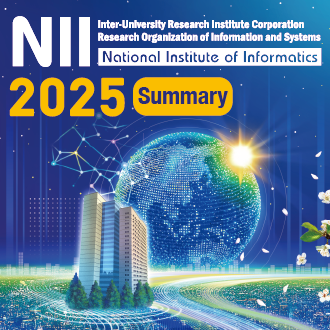 Summary of NII 2024
Summary of NII 2024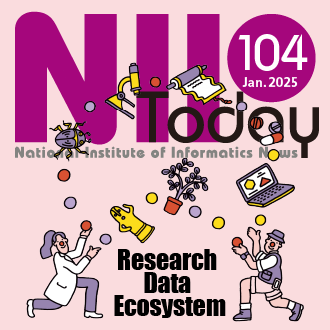 NII Today No.104(EN)
NII Today No.104(EN)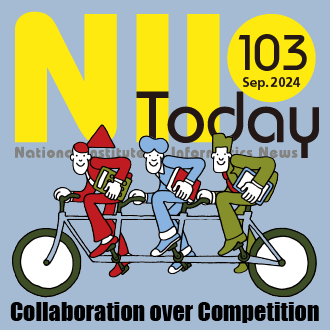 NII Today No.103(EN)
NII Today No.103(EN)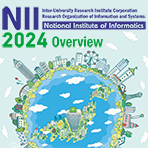 Overview of NII 2024
Overview of NII 2024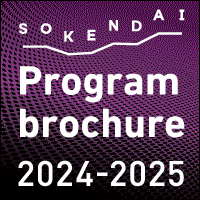 Guidance of Informatics Program, SOKENDAI 24-25
Guidance of Informatics Program, SOKENDAI 24-25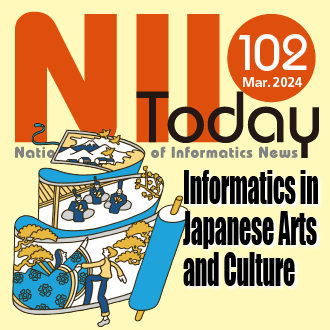 NII Today No.102(EN)
NII Today No.102(EN) SINETStream Use Case: Mobile Animal Laboratory [Bio-Innovation Research Center, Tokushima Univ.]
SINETStream Use Case: Mobile Animal Laboratory [Bio-Innovation Research Center, Tokushima Univ.] The National Institute of Information Basic Principles of Respect for LGBTQ
The National Institute of Information Basic Principles of Respect for LGBTQ DAAD
DAAD
